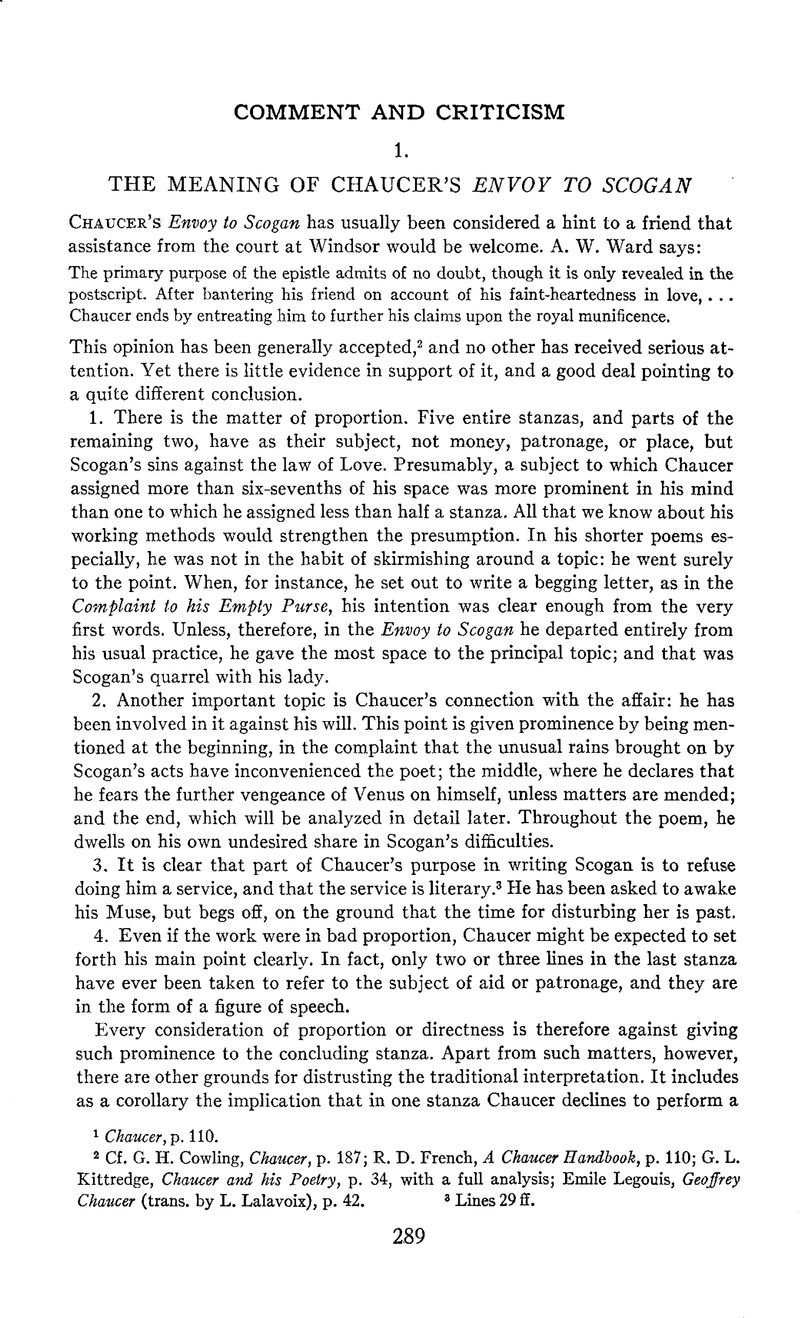No CrossRef data available.
Article contents
The Meaning of Chaucer's Envoy to Scogan
Published online by Cambridge University Press: 02 December 2020
Abstract

- Type
- Comment and Criticism
- Information
- Copyright
- Copyright © Modern Language Association of America, 1933
References
1 Chaucer, p. 110.
2 Cf. G. H. Cowling, Chaucer, p. 187; R. D. French, A Chaucer Handbook, p. 110; G. L. Kittredge, Chaucer and his Poetry, p. 34, with a full analysis; Emile Legouis, Geoffrey Chaucer (trans. by L. Lalavoix), p. 42.
3 Lines 29 ff.
4 No convincing evidence by which to date the work has been discovered; but it is usually assigned to 1393. See French, p. 109; Root, p. 75. Brusendorff argues for an earlier date; but all agree that the poem was composed in the last decade of Chaucer's life.
5 There is dispute whether the person addressed was Henry or his elder brother John, and difficulties stand in the way of accepting either identification. The Moral Ballade (W. W. Skeat, Chaucerian and Other Pieces, p. 237), in which part of Chaucer's Gentilesse is quoted, is ascribed in one manuscript to Henry, in another to John. For information about the former, see Professor W. E. Farnham's discussion (MLR, xvi, 120). The case for John is in Professor Brusendorff's Chaucer Tradition, p. 292; but John died in 1391, is described in a document as “capellane,” and so far as is known, was unmarried.
6 Quotations are from the Oxford Chaucer, edited by W. W. Skeat, i, 396 ff.
7 One objection to supposing Henry Scogan the recipient of the letter is his age. In a legal document of 1391, this is given as thirty. Since the Envoy cannot be of much later date, Chaucer's implication that his friend was already grey and fat (lines 27, 31) is surprising. (Cf. Harvard Studies and Notes in Philology and Literature, i, 115.) At this time, moreover, his son was alive; for in 1407, he succeeded to the inheritance at the age of nineteen. (See Francis Blomefield's Essay Towards a Topographical History of the County of Norfolk, etc., vii, 141 [this volume being edited by Charles Parkin].)
8 Renne is the reading of the prints; the manuscripts have ryme.
9 In the MSS., these places are given as glosses in marginal notes to the last stanza. Professor J. M. Manly thinks that in 1393 Chaucer was busy in the royal forests in Somersetshire (Some New Light on Chaucer, p. 40).
10 Whether Chaucer knew at first hand the De A micitia is uncertain; but he may well have known that the work was full of the spirit of disinterested friendship.
11 Line 40.
12 Modern critics have discovered love allegories in several of his works: for instance, the Complaints of Venus and Mars; The Parliament of Birds; and The House of Fame.
13 See, for instance, Professor J. L. Lowes' Art of Geoffrey Chaucer (London, 1931).
14 Cf. the image of the pen rusting in its case, from Dante; and the numerous echoes in the Envoy to Bukton and the Complaint to his Empty Purse (see A. S. Cook, in Transactions of the Connecticut Academy of Arts and Sciences 23.33).


